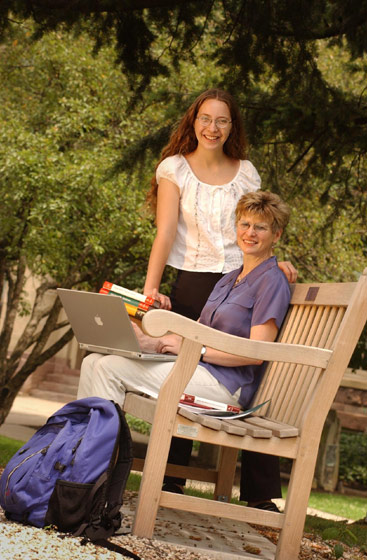Marquis Scholar Briana Niblick ’05 (Hatboro, Pa.) is researching the quest for cultural identity in East Germany along a long-disputed border with Poland this summer. She is working as an EXCEL Scholar with Margarete Lamb-Faffelberger, associate professor of foreign languages and literatures.
“We are examining how East Germans are attempting to create a cross-border identity in the Euroregion Neisse, a region named after a river that separates Germany and Poland,” explains Lamb-Faffelberger. “This area was the site of a disputed border put in place after World War II, and it was made legally valid in a border treaty signed in 1990.”
She adds, “By examining East German, Polish, and Czech literature and regional media, we’re trying to understand how residents of this region are coming to terms with their past and how they are forging a new identity, particularly in light of Poland’s wish to join the European Union.”
Niblick’s interest in the project arose from an independent study advised by Lamb-Faffelberger in which Niblick researched three influential East German writers.
“Now, I am delving into this topic with full force,” says Niblick, a double major in electrical and computer engineering and German. “I am investigating prominent East German writers and how their works reflect and construct an East German identity after the fall of the Berlin Wall in 1989. We are also doing a case study of the Oder-Neisse Region in Saxony. This area is situated along the German-Polish-Czech border, and is an area of cultural clashes as well as cultural exchanges. While the three different nationalities have conflicting historical identities, there are also developing projects in the area, such as German-Polish bilingual kindergartens, which show the promising possibilities of multicultural understanding in the near future.”
In addition to this research, Niblick is helping edit and revise a volume of scholarly essays due for publication this winter.
“Briana is unusual in that she is studying two disciplines,” says Professor Lamb-Faffelberger. “However, her German is at such a high level and so advanced, she is really up to my standards.”
For Niblick, pursuing this EXCEL project fits into her current interests and future plans.
“I have always had a passion for German. I started learning the language at a Saturday School when I was five years old,” she says. “As far as future career plans are concerned, I intend to work for an engineering or technologically-oriented firm, where I can use my German skills on a daily basis. This project will greatly enhance my German proficiency, while teaching me research techniques that I can use in any field, especially engineering.”
As she prepares for her sophomore year at Lafayette, Niblick is pleased with her experience so far. In particular, she likes the personalized attention she receives from faculty.
“Most classes are quite small. My German class last semester had four people in it, including the professor. Professors post office hours but are also approachable outside of those hours. Students can talk to them about coursework, friends, whatever,” she says. “At Lafayette, students are the professors’ priority, whereas on a large university campus, professors tend to focus on their research alone.”
Niblick participates in various extracurricular activities, including the Multicultural Recruitment Team; brass ensemble, concert band and choir; International Students Association; German Club; and America Reads tutoring. She is also activities coordinator for Society of Women Engineers and a participant in the McKelvy Scholars program, in which students of high academic achievement and promise reside in a historic off-campus house and share in intellectual and social activities.

Briana Niblick ’06 studied how Germans living along a Polish border are seeking cultural identity in collaboration with Margarete Lamb-Faffelberger, professor of foreign languages and literatures.
